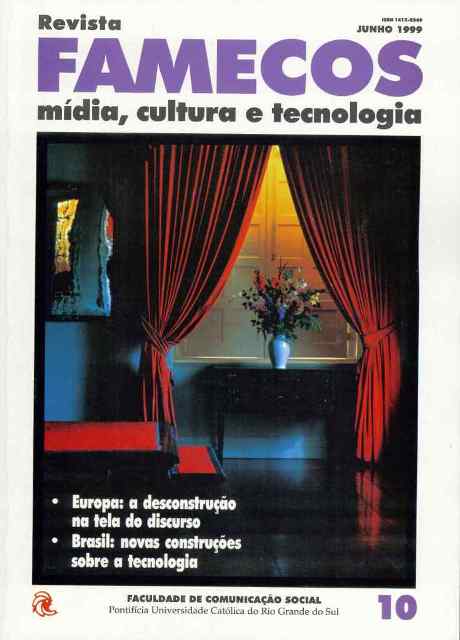The strategic crisis and the privatization of telecommunications: the malaise of the Superior School of War
DOI:
https://doi.org/10.15448/1980-3729.1999.10.3042Keywords:
Communication, Privatization, TelecommunicationsAbstract
In the 1990s, Brazil witnessed the resumption by the private sector of productive sectors that were under the State's control. This study evaluates the position of strategists of the Higher School of War (ESG) in this period and in these circumstances with regard to the structure of telecommunications in the country. It should be remembered that until the 1980s, the understanding of scholars of that institution privileged the concentration of power around a strong and authoritarian state. As a result, they did not accept the fragmentation of the National Telecommunications System as a decisive element in mobilizing the country and expressing its sovereignty.
Downloads
References
AZEVEDO, Fernando de. A Cultura Brasileira. 5. ed. São Paulo: Melhoramentos/EDUSP, 1971.
BULIK, Linda. Doutrinas da Informação: no Mundo de Hoje. São Paulo: Edições Loyola, 1990.
COSTA, Samuel Guimaraes da. Formação Democrática do Exército Brasileiro: Pequena Tentativa de Interpretação Social. Rio de Janeiro: Biblioteca do Exército, 1957.
CASTRO, Terezinha de. Comunidade Econômica Européia: Federação ou Confederação. A Defesa Nacional, n. 761, jul./set., 1993.
CORBISIER, Roland. Formação e problema da cultura brasileira. MEC, 1958.
COSTA, Samuel Guimaraes da. Formação Democrática do Exército Brasileiro: Pequena Tentativa de Interpretação Social. Rio de Janeiro: Editora Biblioteca do Exército, 1957.
COMBLIN, Pe. Joseph. A ideologia da Segurança Nacional: O poder militar na América Latina. Rio de Janeiro: Civilização Brasileira, 1978.
FEROLLA, Sérgio Xavier. Março de 64: uma Visão Histórica. Folha de São Paulo. 28 mar. 1994.
GEROMEL, Sérgio Antônio. As Comunicações na Época da Missão Francesa. A Defesa Nacional, n. 762, out./dez. 1993.
MATTOS, Sérgio. The Impact of 1964 Revolution on Brasilian Television. San Antonio, Texas, 1982.
MICELI, Sérgio. A Noite da Madrinha. São Paulo: Perspectiva, 1972.
OLIVEIRA, Euclides Quandt de. Renascem as Telecomunicações. São José dos Pinhais: Ditel Gráfica e Editora, 1992.
OLIVEIRA, Euclides Quandt de. A televisão no Brasil. Brasília, Gráfica do Senado, 1975.
OLIVEIRA, Euclides Quandt de. A Televisão como Meio de Comunicação de Massa. Brasília: Gráfica do Senado, 1974.
OLIVEIRA, Euclides Quandt de. Política de Comunicações: Ministério das Comunicações, 1976.
PEREIRA, Edvaldo Simas. Telefone: Uma Crise da Época à Espera de Solução. O Observador, n. 247, set. 1956.
SENA, Ernesto. Rascunhos e Perfis. Coleção Temas Brasileiros. Brasília: Universidade de Brasília, 1983.
SILVA, Edmundo de Macedo Soares. O Problema das Comunicações. O Observador Econômico e Financeiro, n. 166, Novembro, 1949, p. 54-64.
SILVA, João Luiz Martins Ney da. Informática e Desenvolvimento. Segurança e Desenvolvimento. Rio de Janeiro, n. 145, ano XX, 1971, p. 121-133.
SIQUEIRA, Ethevaldo. Telecomunicações, receita para vencer a crise. Engenharia na Indústria. n. 21, II Congresso Brasileiro de Telecomunicações, set. 1976.
SODRÉ, Nelson Werneck. A História Militar do Brasil. 3. ed. Rio de Janeiro: Civilização Brasileira, 1979.
WAINBERG, Jacques. Telecomunicação e a Nação-Potência dos Trópicos. In: VVAA, Temas Contemporâneos em Comunicação. I Colóquio Brasil Dinamarca de Ciências da Comunicação, realizado durante o XIX Congresso Intercom, Londrina, 1996, Org. Maria Immacolata Vassalo de Lopez, São Paulo, Edicon, p. 63-87.
TAVARES, Aurélio De Lyra. A Integração Nacional. Segurança e Desenvolvimento. Rio de Janeiro, n. 177, ano XXVIII, 1979.
TAVARES, Aurélio De Lyra. Segurança Nacional, Antagonismos e Vulnerabilidades. Biblioteca do Exército, 1958.
TAVARES, Aurélio De Lyra. Telecomunicações e Segurança Nacional: História e Atualidade. Biblioteca do Exército, 1959.
Downloads
Published
How to Cite
Issue
Section
License
Copyright
The submission of originals to Revista Famecos implies the transfer by the authors of the right for publication. Authors retain copyright and grant the journal right of first publication. If the authors wish to include the same data into another publication, they must cite Revista Famecos as the site of original publication.
Creative Commons License
Except where otherwise specified, material published in this journal is licensed under a Creative Commons Attribution 4.0 International license, which allows unrestricted use, distribution and reproduction in any medium, provided the original publication is correctly cited.






